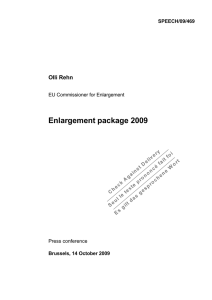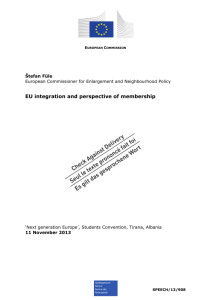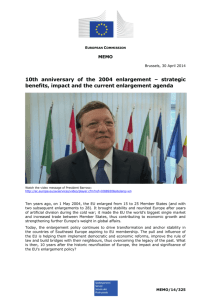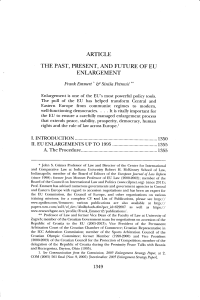The EU Enlargement Process: A Year of Progress in IP/09/1519
advertisement
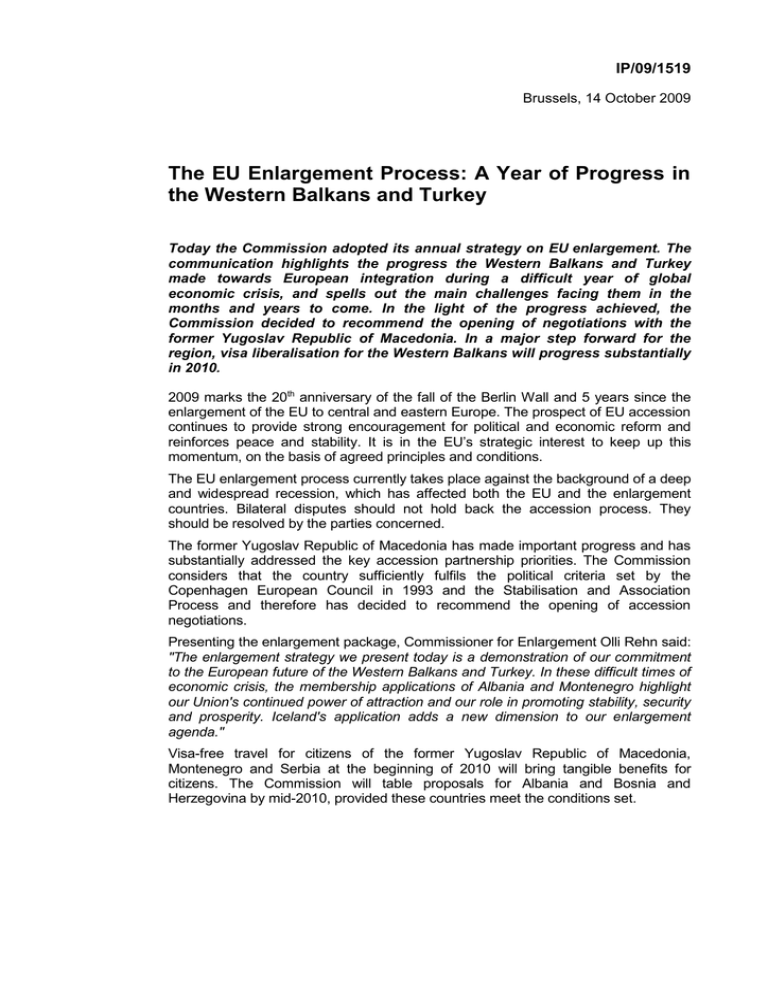
IP/09/1519 Brussels, 14 October 2009 The EU Enlargement Process: A Year of Progress in the Western Balkans and Turkey Today the Commission adopted its annual strategy on EU enlargement. The communication highlights the progress the Western Balkans and Turkey made towards European integration during a difficult year of global economic crisis, and spells out the main challenges facing them in the months and years to come. In the light of the progress achieved, the Commission decided to recommend the opening of negotiations with the former Yugoslav Republic of Macedonia. In a major step forward for the region, visa liberalisation for the Western Balkans will progress substantially in 2010. 2009 marks the 20th anniversary of the fall of the Berlin Wall and 5 years since the enlargement of the EU to central and eastern Europe. The prospect of EU accession continues to provide strong encouragement for political and economic reform and reinforces peace and stability. It is in the EU’s strategic interest to keep up this momentum, on the basis of agreed principles and conditions. The EU enlargement process currently takes place against the background of a deep and widespread recession, which has affected both the EU and the enlargement countries. Bilateral disputes should not hold back the accession process. They should be resolved by the parties concerned. The former Yugoslav Republic of Macedonia has made important progress and has substantially addressed the key accession partnership priorities. The Commission considers that the country sufficiently fulfils the political criteria set by the Copenhagen European Council in 1993 and the Stabilisation and Association Process and therefore has decided to recommend the opening of accession negotiations. Presenting the enlargement package, Commissioner for Enlargement Olli Rehn said: "The enlargement strategy we present today is a demonstration of our commitment to the European future of the Western Balkans and Turkey. In these difficult times of economic crisis, the membership applications of Albania and Montenegro highlight our Union's continued power of attraction and our role in promoting stability, security and prosperity. Iceland's application adds a new dimension to our enlargement agenda." Visa-free travel for citizens of the former Yugoslav Republic of Macedonia, Montenegro and Serbia at the beginning of 2010 will bring tangible benefits for citizens. The Commission will table proposals for Albania and Bosnia and Herzegovina by mid-2010, provided these countries meet the conditions set. Concerning Turkey, Commissioner Rehn went on to say: “Turkey has shown renewed political reform efforts. Progress with its accession negotiations hinges on this momentum, especially the consolidation of fundamental freedoms and the rule of law. We welcome the recent consultations on an important Kurdish initiative which, I hope, will result in concrete actions for the rights of all Turks." "I'm encouraged by the historic steps Turkey and Armenia have just taken towards normalising their relations. This process should now lead to full normalisation as soon as possible." Croatia has made good progress in meeting the benchmarks set in the accession negotiations and negotiations have now formally resumed following the political agreement between Slovenia and Croatia over handling the border issue. Croatia will need to pursue its reform efforts, in particular on the judiciary and public administration, the fight against and organised crime, and minority rights. If Croatia meets all outstanding benchmarks in time, the accession negotiations could be concluded next year. Montenegro applied for EU membership in December 2008 and the Commission is currently preparing an Opinion as requested by the Council. Parliamentary elections met almost all international standards. Strengthening administrative capacity and consolidating the rule of law remain major challenges. Albania applied for EU membership in April. The Commission stands ready to prepare its Opinion, once invited to do so by the Council. Parliamentary elections met most international standards. Strengthening the rule of law and ensuring the proper functioning of State institutions remain major challenges. Bosnia and Herzegovina urgently needs to speed up key reforms. The country's European future requires a shared vision on the overall direction of the country by its leadership, the political will to meet European integration requirements and to meet the conditions which have been set for the closure of the OHR. Serbia has demonstrated its commitment to moving closer to the EU by building up a track record in implementing the provisions of the Interim Agreement with the EU and by undertaking key reforms. In light of sustained cooperation with ICTY, the Commission considers that the Interim Agreement should now be implemented by the EU. Serbia needs to demonstrate a more constructive attitude on issues related to Kosovo. In Kosovo1, stability has been maintained but remains fragile. The EU's rule of law mission EULEX has been deployed throughout Kosovo and is fully operational. Kosovo faces major challenges, including ensuring the rule of law, the fight against corruption and organised crime, the strengthening of administrative capacity, and the protection of the Serb and other minorities. In a separate document, the Commission proposes to bring Kosovo's citizens closer to the EU, including through a visa dialogue with the perspective of eventual visa liberalisation when the necessary reforms will have been undertaken and the conditions met. The Commission also proposes to extend the preferential trading regime ("autonomous trade measures") that Kosovo currently benefits from and will propose negotiating directives for a trade agreement once Kosovo meets the relevant requirements. 1 Under UNSCR 1244/99 2
